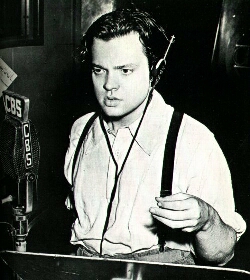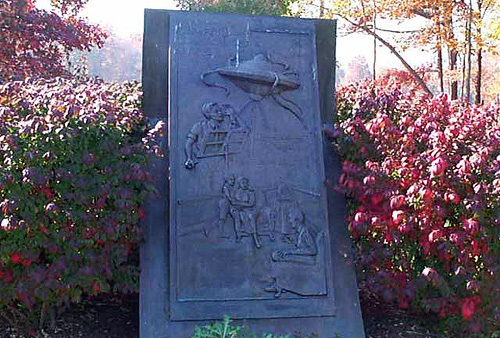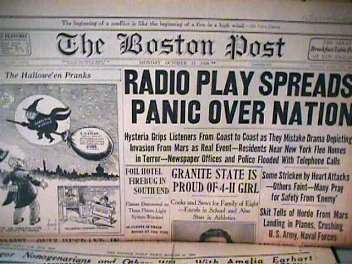2X2L calling CQ… 2X2L calling CQ… 2X2L calling CQ New York.
Isn’t there anyone on the air?
Isn’t there anyone on the air?
Isn’t there anyone…– Ham radio operator, CBS Broadcast of The Mercury Theatre of the Air, October 30th, 1938.

Orson Welles
On the verge of the second world war, Howard Koch and John Houseman of The Mercury Theatre of the Air, co-founded and produced by Orson Welles, wrote an adaptation of the novel for airplay. It was performed by Orson and the players of the Mercury Theatre on 13 October 1938; the night before Halloween. Rather than preserving the narrative approach, this radio play presented the tale as a real-time news report. The scene of the action was shifted from London to New York, the home of The Mercury Theatre of the Air. The story was relayed through a series of as-it-happens reports, as if a Martian invasion were actually happening and being reported live on radio. The Martian landing site, Grover’s Mill, New Jersey, was chosen at random; the little town was put “on the map” by a literal, random stab of a finger at a map.

Grover’s Mill Monument
The “as-if-real” approach had an unexpected effect on the listening population of New York. Despite the radio-play being announced as such at its commencement and at an intermission two-thirds into the story, a format change from “radio broadcasts” to an Orson Welles narration (playing the part of Professor Richard Pierson) and a final apology from Welles himself, where he characterized the play as “the Mercury Theatre’s own radio version of dressing up in a sheet and jumping out of a bush and saying, ‘Boo!'”, much of the audience took the broadcast to be real. The interruption of dance music from downtown New York with updates from scientific authorities and reporters on the scene, combined with the sudden cutting-off of communications as the Martians used their weapons, and a chilling call by a lonely ham radio operator searching for anyone receiving in New York, convinced many that invaders from Mars were really moving toward New York in gigantic metal tripods and wiping out all before them with Heat-Rays and Black Smoke.
A subsequent report on the broadcast explained that “People packed the roads, hid in cellars, loaded guns, even wrapped their heads in wet towels as protection from Martian poison gas, in an attempt to defend themselves against aliens, oblivious to the fact that they were acting out the role of the panic-stricken public that actually belonged in a radio play.” Inadvertently, in a single night, The Mercury Theatre on the Air demonstrated the power that mass communication had over the general populace.

H.G. Wells met Orson Welles in 1940 and stated that he was quite taken with the radio production and jestingly wished that Orson drop the second ‘e’ from his name.
– written by Rob Farquhar